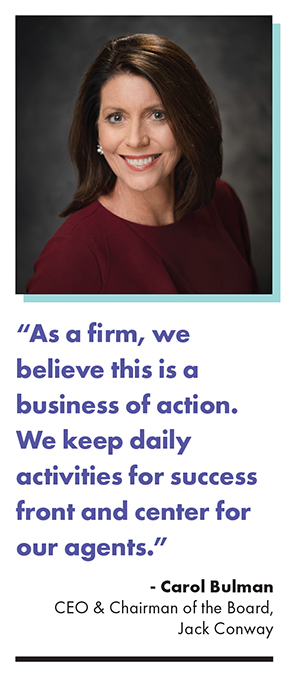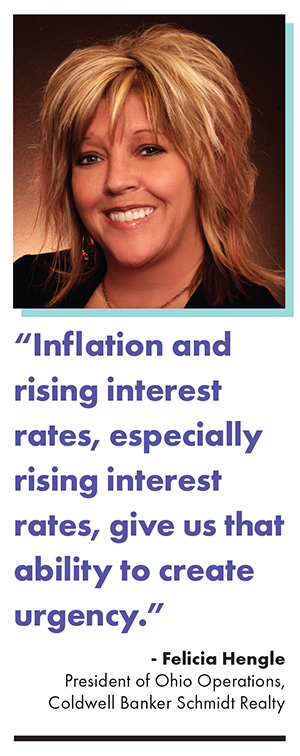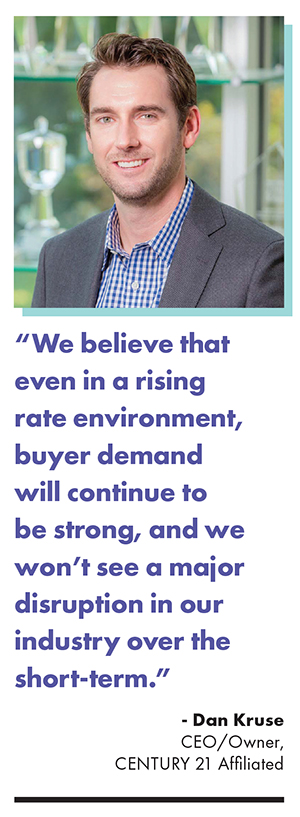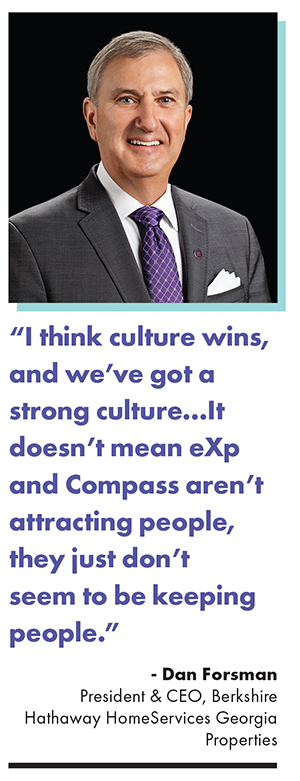Coming off the red-hot real estate market of 2021, Power Brokers are regrouping and preparing for what lies ahead, unpredictable as that may be. Their outlook and their approach are grounded in market realities and the proven methods that have carried their firms through many a challenge. Here, Power Brokers provide insights on the biggest issues at hand—from inventory to inflation—and the strategies they’re deploying to ensure another successful year in 2022…no matter how the next chapter unfolds.
Participants:
Carol Bulman, CEO & Chairman of the Board, Jack Conway
Dan Forsman, President & CEO, Berkshire Hathaway HomeServices Georgia Properties
Joe Gazzo, Regional VP and Broker, Coldwell Banker Schmidt Realty
Rick Haase, President, United Real Estate
Felicia Hengle, President of Ohio Operations, Coldwell Banker Schmidt Realty
Dan Kruse, CEO/Owner, CENTURY 21 Affiliated
Teresa Overcash, Broker/Owner, Realty ONE Group Results
Mike Prodehl, CEO, Coldwell Banker Real Estate Group
Jessica Smith, Executive Vice President, Briggs Freeman Sotheby’s International Realty
Todd Sumney, Chief Industry Officer, HomeSmart International
How have the effects of 2021 impacted business in 2022?
Mike Prodehl: The events of 2021 will continue to have a moderate impact on our market. The most pressing concern continues to be the scarcity of inventory with no end in sight. Rising rates may limit the buyer pool somewhat, but hopefully they will also get some people who have postponed plans off the fence. Inflation and other economic concerns may rattle consumer confidence, but the cost to rent will continue to compel people into homeownership. The continued pandemic has had much less impact on our markets than the inventory crisis.
 Jessica Smith: The continued pandemic has limited our large group gatherings, but it has not limited our agents from doing their job or reaching new heights. Texas continues to draw new corporations and transferees, keeping the housing demand strong. Since a large percentage of buyers are from out of state, the inventory has and will be our biggest challenge this year.
Jessica Smith: The continued pandemic has limited our large group gatherings, but it has not limited our agents from doing their job or reaching new heights. Texas continues to draw new corporations and transferees, keeping the housing demand strong. Since a large percentage of buyers are from out of state, the inventory has and will be our biggest challenge this year.
Felicia Hengle: I’ve always been one to see the glass as half-full, maintaining a positive outlook as much as possible. Somehow through the pandemic, which we have all had to face in not only our personal lives but our business as well, I still believe that there is that silver lining. In the meantime, we’re all in it together, and there will always be enough business to go around. Competition and trying times are not necessarily a bad thing, but what’s most important is that we stay true to ourselves and never lose sight of why we got into the business in the first place. It’s all about relationships.
How are you planning for the possible effects of inflation and rising interest rates on the housing market?
Dan Kruse: It’s clear that we’re in a rising rate environment. The big question is how high will rates get due to the pressures of inflation? As a company, we are talking about this new environment and preparing our agents for the consumer discussion. With that said, we believe that even in a rising rate environment, buyer demand will continue to be strong, and we won’t see a major disruption in our industry over the short-term.
Rick Haase: We have a very robust process for developing our annual operating plan—which, of course, takes a serious and exhaustive look at sales and financial forecasting. We are fortunate to have industry and non-industry veterans alike, each having seen these business cycles before. The causes for the cycles vary widely, but the core processes of strong fiscal management are well in place, and have been for some time. Everyone speaks of expense controls, and while we obviously know how to manage that area, we are excited to continue implementing our marketshare growth strategies.
Dan Forsman: We are much more resilient than we once were after two years of pandemic and uncertainty. We now have a contingency plan that’s been on the shelf in the event that sales stall or a negative situation occurs. We’ve always done a good job of controlling our costs, and we’re leaning heavily into what most consumers want, which is one-stop shopping. We’re doing everything we can to support core services.

Carol Bulman: We are focused on educating our agents on what’s happening in the market at all times, and with the support of our mortgage company, Conway Financial Services, we provide real-time information and tools for our agents to be prepared for any market. As always, we will face this new challenge by arming our agents with data and strategies to speak directly to their clients and show them what is really happening in the market and how it affects them. This will cause a shift in buyer demand and seller opportunity, but it will bring about a more normal balance, which might be healthy for both agents and clients alike.
Felicia Hengle: I’ve always believed that there are two aspects of our business that everyone should be able to articulate. First is the ability to gain credibility in all that we do, and secondly, the ability to create urgency. Inflation and rising interest rates, especially rising interest rates, give us that ability to create urgency. Those buyers and sellers who are on the fence as to whether they should make the move or not can now see the writing on the wall…now may be that time. Unfortunately, those who sit on the side of caution may elect to stay put and ride things out.
What strategies have you put in place to counter the inventory shortage?
Rick Haase: The question at a macro level is not, “Will there be enough inventory?” There will be plenty of inventory, although at lower levels for sure. The proper question for us is, “How will we make sure that our brokers and agents are prepared to gain share of the market?” So we have been driving more marketing, technology and education services, including accelerating the advancement of our cloud-based productivity platform. In transitioning markets, it becomes even more important to have efficient and effective systems in place. We are fortunate that these elements have resided in our business model and brokerage network since inception.
 Todd Sumney: The inventory shortage is really an “active inventory shortage.” As soon as a home hits the market, it goes under contract or inactive quickly; therefore, the usual “active inventory” is low. The overall transactions for the year are still projected to be well over 5 million units. The trick is to be one of the agents involved in those transactions, so we launched some extensive agent training specifically around creating inventory and winning listings—and the results were astounding. We taught agents many different ways to create inventory through mini comparative market analyses, neighborhood reports, neighborhood farming, video marketing, texting, social media and more.
Todd Sumney: The inventory shortage is really an “active inventory shortage.” As soon as a home hits the market, it goes under contract or inactive quickly; therefore, the usual “active inventory” is low. The overall transactions for the year are still projected to be well over 5 million units. The trick is to be one of the agents involved in those transactions, so we launched some extensive agent training specifically around creating inventory and winning listings—and the results were astounding. We taught agents many different ways to create inventory through mini comparative market analyses, neighborhood reports, neighborhood farming, video marketing, texting, social media and more.
Teresa Overcash: While inventory is low, we have partnered with an in-house builder who can create new homes for our buyers caught in bidding wars. We are also opening up a luxury division this year and encouraging our investors to purchase multifamily/rental properties so that we have many great options for frustrated buyers who want to buy but are tired of the bidding wars. We also make sure to educate the buyer that even though prices are higher than average, the interest rates more than make up for the price increase over a 30-year mortgage loan.
Joe Gazzo: These truly are unprecedented times we are experiencing, and while we all may be experiencing the same storm, we are not all in the same boat. Those that continue to work their databases are the ones who will have the edge and find themselves with the ability to remain successful. We have platforms designed for such activities, along with other tools our agents can utilize to keep them up front and engaged during these challenging times. We actively focus on farming, builders, mining for listings and going back to basics with “just solds” and social media messaging for sellers who want to know what their home may be valued at in today’s market.
Carol Bulman: As a firm, we believe this is a business of action. Through the teachings of Ninja Selling, we keep daily activities for success front and center for our agents. This week (at press time), we are providing a 30-minute workshop each day on ways to revisit members of our sphere. In addition, we provide consistent training on how to make buyers’ offers most attractive and win more on that side.

Dan Kruse: This has been an ongoing issue in our industry for years now. I’m not sure there’s a magic bullet to this challenge, however, we’re coaching our agents around the real estate basics: prospecting, winning listing appointments and offering a value package.
Companies like Compass and eXp are putting up big numbers this year. Are ‘disruptor’ firms a concern for you—and, if so, how are you creating a competitive advantage?
Felicia Hengle: I’m not quite sure if the word is “concerned,” but we always try to stay on top of not only companies entering our market, but the latest trends as well. Cloud brokerages, such as eXp, benefited to a certain degree from the pandemic because of agents who no longer felt the need to go to the office. Erring on the side of caution, they chose to work remotely. Our contention, while we continue to monitor the real estate landscape, is to continue to stay focused on what has made us successful: pouring into our agents, giving them the support they need to be successful and the tools to aid both their buyers and sellers. We continue to focus on our differentiators so that the agents know they are a part of a company that is on the cutting edge and one that can help them build a viable, sustainable business.
Dan Kruse: We’ve seen a number of “disruptors” or new models come into the real estate space over the last few years; this is not uncommon in a growing marketplace. Although some of these companies have some new structures, such as private equity backing or being publicly traded, the concept of these structures is not that different from others. We’re an industry where, at the heart, we service clients in making the best possible real estate decisions. That concept has not changed, so I would say our competitive advantage continues to be our outstanding customer service, systems and coaching, and years of experience.
Carol Bulman: In our market, we are the disruptor with a new brand and bringing a new HQ building with state-of-the-art technology online. No one in the area has invested in these tools locally, and we’re facing a huge spotlight right now as we lead in these areas. I’m very proud of the work my team has done to make this all possible.
 Rick Haase: I think in 2020 we were the fastest-growing real estate firm in the nation, outperforming the market gains by a long margin. When the industry numbers are in for 2021, I believe our growth rate will actually increase year-over-year. So in short, we are the disruptor, and we believe passionately that our growth is actually in the most sustainable model. We’re not building on fleeting advantages like others, but on rock-solid foundational business principles. We’re profitable, our agents are winning more business and our brokerages are gaining agents as well; we’re scaling, and our enterprise value is growing exponentially, not declining.
Rick Haase: I think in 2020 we were the fastest-growing real estate firm in the nation, outperforming the market gains by a long margin. When the industry numbers are in for 2021, I believe our growth rate will actually increase year-over-year. So in short, we are the disruptor, and we believe passionately that our growth is actually in the most sustainable model. We’re not building on fleeting advantages like others, but on rock-solid foundational business principles. We’re profitable, our agents are winning more business and our brokerages are gaining agents as well; we’re scaling, and our enterprise value is growing exponentially, not declining.
How have you changed up your approach to recruiting and retention in the midst of trying times for real estate agents?
Dan Forsman: The first “R” in recruiting is retention. We’ve stayed very focused on meeting the needs of agents, talking to our top agents and growing our middle tier. Because of that, I think we’ve been most fortunate in the “turnover wars.” I think culture wins, and we’ve got a strong culture of giving, growing and going to the next level in our company. It doesn’t mean eXp and Compass aren’t attracting people, they just don’t seem to be keeping people. I’m talking to more agents about coming back from Compass than ever before. There’s always that threat, but we’re focused on growing what we’ve got, retaining what we have and attracting new talent to the company.
Dan Kruse: Building our organization around outstanding real estate professionals has always been one of the keys to our success. We continue our recruiting strategy around building great professionals and coaching them on how to succeed in a changing real estate environment. I think the biggest challenge is helping our newer agents find success early in their career, which can be challenging in a competitive market with low inventory. We’re proud of the number of successful first- and second-year agents we’ve seen grow this past year.

Joe Gazzo: From a retention standpoint, staying connected with our agents is paramount, especially during the times we’ve all experienced over the past few years. With offices opening up again, experiencing a bit of normalcy is a welcome thing to say the least, and having such engagement stands only as a reminder as to one of the reasons they joined our company. We are concentrating on live training and events to foster collaboration and synergy to remind our agents of the culture that attracted them to us in the first place.
Felicia Hengle: From a recruiting standpoint, it boils down to a number of things, and not necessarily strictly the commissions. It’s articulating our value proposition, stressing our core values and giving them the support they need to be successful while fulfilling what’s most important to them. Our management team offers years of experience, and what comes with such experience is the ability to help weather the storm during such trying times. We also rely on our agents to be our raving fans and help us to tell our story while out in the marketplace.
Rick Haase: We are simply re-doubling our efforts to get our story out. As we demonstrate the incredible opportunity within our systems to help agents win business and brokerages to manage their operations, it is reaping great rewards. We keep as a guiding principle that our efforts are all about increasing our agents’ and brokers’ financial trajectory. Recruiting with a discounted stock purchase program or paying agents in shares to help recruit when those shares lose 50%, 60%, even 75% of their value isn’t much of a net-worth growth plan, and agents are figuring that out pretty quickly. We are investing even more in training, education and development, communications, broker outreach, agent marketing and technology services and lead generation in the coming year with great efficiency.
 Maria Patterson is RISMedia’s executive editor. Email her your real estate news ideas to maria@rismedia.com.
Maria Patterson is RISMedia’s executive editor. Email her your real estate news ideas to maria@rismedia.com.












